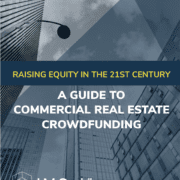Using the Issuer Exemption vs a Broker-Dealer: A Pragmatic View
Guest Author: Greg Brown, Head of Real Estate, VENTURE.co
I am not a lawyer. And there are plenty of lawyers that will argue both sides of the question that issuers ask themselves when raising capital for investment in commercial real estate: Do I need a broker-dealer (BD)?
In short, you don’t NEED a broker-dealer to raise private capital. There are ways to use the Issuer Exemption (detailed ad nauseum here), and historically speaking, prior to the JOBS Act of 2012, it was usually cost prohibitive to hire a broker-dealer if you were raising less than $25 million. Further, there has clearly been plenty of capital raised without one. Rather than bore you with pages of securities regulations (but found here if you’re into that sort of thing), I want to spell out the business case for using a BD.
Issuer Exemption
So can you use the Issuer Exemption? Well, there are limitations. In summary (full details here), you likely cannot use the Exemption if you answer yes to one or more of the following:
- You are a serial issuer, raising capital more than once in a 12-month period.
- You employ somebody to sell securities / raise the capital as their primary role.
- You pay people or firms commissions to raise money for you.
An obvious red flag is when persons participate in several securities transactions as a serial issuer, especially if these occur within a 12-month time period. Even if they occur outside the 12-month time frame, the SEC expects people who continuously participate in securities offerings of different issuers to be registered, which entails being affiliated with a licensed BD.
While the second and third bullets seem pretty straightforward, the first one is where people can potentially get in trouble. They (and their attorneys) believe that since most commercial real estate raises are for Single Purpose Entities (SPE) or Special Purpose Vehicles (SPV), that by their very nature they aren’t serial raisers – because that entity only raises capital once. Convenient, right?
Well, what happens when a principal sponsor of those SPE/SPVs shows up in several real estate raises? Do we not think regulators are going to potentially look at that? As my friend Scott Andersen (finlawyer.com) says, “When regulators come calling, the burden often falls on the individual to convince regulators as to why they do not need to be registered with a BD.” And the penalties for such non-compliant behavior? Small things like injunctive relief (including that you get shut down), disgorgement (return all ill-gotten gains), and civil penalties.
Compliance
Many CRE issuers underestimate everything that goes into making sure a securities offering is compliant, and they usually leave the work for their attorneys. But what if you don’t have a good securities attorney? Do you leave that with your real estate attorney? The importance of securities law expertise cannot be underestimated, and here is why: if something does go wrong and an offering was found to be non-compliant, you may have very little recourse to your attorney, assuming he does not hold out expertise in securities law as a specialty.
But with a broker-dealer, quite literally, their licensure is on the line. The broker-dealer of record is responsible for many levels of securities compliance, for due diligence regarding the offering, and for judging the suitability of an investment to particular investors. They have communicated to the marketplace that this offering is compliant.
This vetting is particularly important with what I call ‘professional money’. Registered Investment Advisors (RIAs), Family Offices, or others with fiduciary responsibility appreciate the gravitas behind a broker-dealer offering and might not be as quick to recommend or invest in an Issuer Exemption offering. They know broker-dealers have performed Bad Actor checks, Anti Money Laundering (AML), Office of Foreign Asset Control (OFAC), Financial Crimes Enforcement Network (FinCen), and BDs are required to make all the necessary disclosures and filings on both the Federal and State level – in every state the offering is available.
Cost
It is frequently argued by non-broker-dealer affiliated platforms that registering with a BD is both unnecessary and expensive. With the issues laid out above, issuers can decide if using a BD is necessary and worth the investment.
What I can speak to is that it is often NOT cost prohibitive. By using a BD you send a strong and committed message to investors that your offering is worthy of their attention – you have welcomed the vetting of a BD and offer full transparency into you and your offering. And this is very valuable in a market where investors are looking to build trusting relationships.
Scott also said recently in a recent IMS webinar that part of “The JOBS Act is the marriage of the securities and the real estate industries.” The JOBS Act has disrupted the broker-dealer industry in a way that now makes that value of using a BD available and cost-effective to all issuers, including those with multiple real estate offerings.







